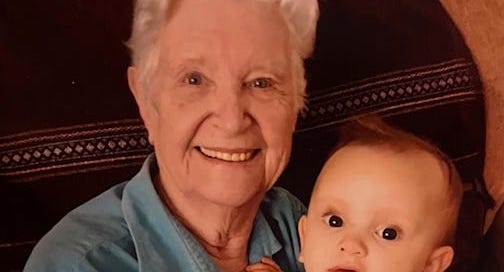What's The Difference Between Alzheimer's Disease And Dementia?
A Continuation of June's Health Blog
Hey Friends!
Welcome back to my health blog, “Surviving Modern Medicine.”
Since June is National Alzheimer’s and Brain Awareness Month, I thought we would continue on with Alzheimer’s disease and dementia this week. As always, if you have any specific requests, please don't hesitate to reach out.
Just a heads up…I have my last eye surgery scheduled for Monday, so I might be out of commission for a few days. Hopefully, it won’t be too bad. Fingers crossed!
Now, on to our topic for today.
Difference Between Alzheimer’s Disease and Dementia
One of the most common questions I was asked as a nurse in long-term care was, What’s the difference between Alzheimer’s and dementia?
I can understand the confusion. Everyone, including medical professionals, uses the terms Alzheimer’s and dementia interchangeably. However, they do have different meanings.
We will take a look at each independently, but here’s the Cliff Notes version. The main difference between them is that dementia is a generalized collection of cognitive symptoms, whereas Alzheimer’s is a specific disease of the brain. Alzheimer’s causes cognitive decline, which eventually leads to dementia. Now, let’s look a little closer at each one.
Dementia
Dementia is not a specific disease. It’s more of a generalized term that describes symptoms such as memory loss, disruption of language and problem-solving, and loss of other cognitive abilities. These symptoms become severe enough to affect a person’s quality of life.
There are many different types and causes of dementia. However, the reason dementia and Alzheimer’s get intertwined is that Alzheimer’s is the most common disease that results in dementia.
Alzheimer’s accounts for 60–80% of dementia cases. The second most common cause of dementia is Vascular dementia. Many more conditions causing severe cognitive impairment result in dementia.
Dementia is too often referred to as senile dementia, which is the widespread belief that mental decline is a normal part of aging. This is incorrect. Dementia is NOT a normal part of aging.
Alzheimer’s Disease
Alzheimer’s is a degenerative brain disease that is caused by changes in the brain following cell damage. It eventually leads to dementia symptoms that gradually worsen over time.
In Alzheimer’s, a high level of proteins makes it difficult for the brain to communicate with itself. The brain cells in the hippocampus are the first to be damaged, causing memory loss and difficulty learning. This is why memory loss is typically the first symptom of Alzheimer’s disease.
As this disease progresses, the symptoms get more severe, including disorientation, confusion, and behavior changes. Eventually, Alzheimer’s can even affect a person’s ability to walk, talk, and swallow.
Most people with Alzheimer’s are over the age of 65, but over 200,000 Americans also suffer from early-onset Alzheimer’s. The risk of getting this disease increases with age. However, Alzheimer’s is also NOT a normal part of aging.
Alzheimer’s worsens over time, but each person progresses at their own rate. Typically, the average person lives 4–8 years after diagnosis, but there are cases of people living over 20 years with Alzheimer’s.
Here are the several different stages of Alzheimer’s disease:
Preclinical Alzheimer’s- Consists of changes in the brain years before any signs or symptoms appear.
Early-Stage Alzheimer’s (Mild)- A person still functions independently and may also still work and drive. They are beginning to have some problems with memory, planning, and performing tasks. Family and friends start to take notice.
Middle-Stage Alzheimer’s (Moderate)- This is the longest stage, lasting for many years. Their symptoms are more noticeable and include word confusion, frustration, difficulty communicating, and they need assistance with tasks. They can also forget their personal history, address, and the current date/time. Families report issues with wandering, suspicion, and repetitive behavior.
Late-Stage Alzheimer’s (Severe)- People lose the ability to respond to their environment. They also lose the ability to walk, communicate, and swallow, requiring round-the-clock care. All of this makes them vulnerable to infections and pneumonia.
Diagnosis of Dementia or Alzheimer’s Disease
Unfortunately, there is NO single test to diagnose someone with either dementia or Alzheimer’s. Doctors must diagnose based on careful medical history, physical exams, labs, and behavioral assessment. In most cases, a specialist is needed to specify exactly what type of dementia is responsible.
Treatment
While there is still no cure for Alzheimer’s, there are two new treatments that show some promise. Donanemab (Kisula) and Lecanemab(Leqembi) have shown in studies that they decrease cognitive and functional decline in people with early Alzheimer’s.
Some other medications can slow the progression of dementia symptoms and improve a person’s quality of life.
Studies also show that a healthy diet, smoking cessation, regular exercise, and regular cognitive stimulation can decrease cognitive decline and dementia.
What Should I Do?
If you notice someone is experiencing new cognitive impairment, DO NOT ignore them or make excuses for it. Take them to the doctor! This is so important because some conditions that affect cognitive function are treatable.
Even if it is dementia or Alzheimer’s, early diagnosis allows a person to benefit from the best available treatment, which can slow the progression of the disease and increase their quality of life.
Conclusion
Alzheimer’s disease and dementia are not the same. Now you can impress everyone with your new medical knowledge! More importantly, now you are aware of what symptoms to look for and how to respond to get someone you love the help they deserve.
Dear Readers,
Thanks so much for stopping by! Please be aware that this article is for educational purposes only and should not be used in place of medical advice.
Also, please click below to help support my blog. I have been out of work for quite a long time due to many health issues and would greatly appreciate your support. Thanks for your kindness ❤







Thank you so much. My sister was diagnosed with early onset Alzheimer's last year. She doesn't think she has a problem. It's very sad. She doesn't know dates or days of the week and she has trouble using her debit card and getting gas.
A wonderful, clear explanation - thank you!